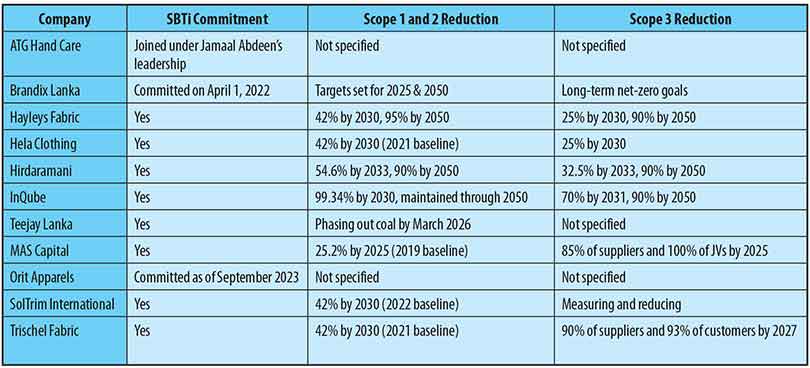Monday Feb 23, 2026
Monday Feb 23, 2026
Tuesday, 29 April 2025 03:46 - - {{hitsCtrl.values.hits}}

Sri Lanka’s corporates particularly in the apparel sector, are making significant strides in sustainability, with leading apparel and textile, manufacturing, and textile companies aligning with the Science-Based Targets initiative (SBTi). From industry giants like Brandix, Hirdaramani, Hayley’s Fabrics and MAS to innovators such as InQube, Hela Clothing, and SolTrim, companies are setting measurable targets to reduce greenhouse gas (GHG) emissions across operations and supply chains.
Whether reducing direct emissions from operations (Scope 1), cutting indirect emissions from purchased energy (Scope 2), or addressing supply chain-wide impacts (Scope 3), these firms are driving a collective shift toward greener, more responsible business practices. Their efforts position Sri Lanka as a rising leader in sustainable manufacturing and long-term net-zero commitments.
Driving change
Hirdaramani Group has become Sri Lanka’s first company to secure SBTi approval for its Net-Zero targets, aiming to cut Scope 1 and 2 emissions by 54.6% by 2033. Backed by a robust decarbonisation strategy, this milestone highlights their leadership in tackling fashion’s environmental impact. “Sustainability is a way of life at Hirdaramani — our efforts are sincere and focused on lasting change,” said Director Siddarth Hirdaramani, reinforcing the Group’s long-term commitment to positive environmental impact.
Brandix Lanka, one of Sri Lanka’s leading apparel companies, has committed to the SBTi, setting ambitious goals — near-term targets for 2025 and long-term plans for 2050 — to align with the 1.5°C pathway. MAS Capital, another key player, is pioneering renewable energy adoption and engaging suppliers to meet ambitious sustainability goals. By 2025, the company aims to cut Scope 1 and 2 emissions by 25.2% and ensure that 85% of its suppliers adopt science-based targets. “Sustainability isn’t a destination; it’s a journey of continuous improvement. We’re focused on exceeding our targets and driving positive change across our value chain,” says Dhanujie Jayapala of MAS Capital.
Meanwhile, Hayleys Fabric has a structured roadmap toward net zero, targeting a 42% reduction in Scope 1 and 2 emissions and a 25% reduction in Scope 3 by 2030. It’s net-zero commitment is 95% reduction in Scope 1 and 2 emissions and a 90% reduction in Scope 3 by 2050. With 73% of its energy already sourced from renewables, Hayleys is expanding solar power and transitioning from traditional fuels to biomass. “We believe sustainability is a responsibility and a competitive advantage. Our commitment to net zero reflects our drive to lead by example in sustainable manufacturing,” says Hayleys Fabrics PLC Deputy General Manager, Sustainability Lakmal Diyawaththege.
InQube Global stands out with one of the boldest sustainability commitments, pledging a 99.34% reduction in Scope 1 and 2 emissions by 2030. The company is integrating sustainability into product innovation and business operations, ensuring long-term industry impact. “For us, sustainability isn’t just a pledge — it’s the foundation of how we innovate and grow. Beyond cutting emissions, we’re redefining what responsible apparel manufacturing looks like, creating a future where fashion and sustainability go hand in hand,” says an InQube spokesperson.
Hela Clothing, SolTrim International, and Trischel Fabric have also made strong commitments to emission reductions, targeting significant Scope 1, 2, and 3 reductions by 2030. Teejay Lanka is driving industry-wide transformation, eliminating coal by March 2026 and exploring groundbreaking solutions like salt recovery from wastewater. “The future of Sri Lanka’s apparel sector depends on our ability to innovate sustainably. We’re committed to redefining what responsible manufacturing looks like,” says Mendaka Hettithanthri of Teejay Lanka.
Sustainability commitments:
Looking ahead
These sustainability commitments reflect a broader transformation in Sri Lanka’s corporate sector, where environmental responsibility is becoming integral to business strategy. By proactively addressing emissions, these companies are not only meeting global sustainability expectations but also enhancing competitiveness in the global marketplace. As they continue their sustainability journey, Sri Lanka’s corporate sector is setting an example for responsible, forward-thinking business practices that will shape the future of manufacturing and apparel industries worldwide.